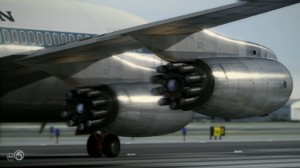So I wanted to talk about Pan Am a bit.
Pilots
I really like television pilots that don’t quite know what they’re doing. I like how eager they are, how they’re all like omg omg look at all these cool ideas we have! and yeah, some of those ideas aren’t real solid, but it’s hard not to get caught up in how excited the show is at merely existing.
Pan Am doesn’t quite seem sure what it is yet, and I’m ok with that. Not knowing exactly where this is going to go is part of what makes it fun.
Mad Men
It’s sort of impossible to talk about this without mentioning Mad Men.
I’ll start by saying that calling these shows competitors is kind of insulting to both. For better or worse, Pan Am isn’t Mad Men on a Plane, nor is it trying to be.
What I think is worth talking about, however, was the two shows’ different approaches to feminism. I could write pages and pages about this, but I guess the basic idea is, if your goal as a show with a feminist agenda is to make the world a more egalitarian place by having people watch you, I think Pan Am has the more viable approach.
The show itself is easy to get into. I was pretty much sold on the show before the first commercial break. It’s fun, it’s zippy, it’s visually stunning. Whatever it’s saying, I suspect it’s at least going to communicate it to a wide audience. Yes, I’ve started watching Mad Men, but in the sort of way you’ll choke down a new food for a while so you’ll eventually develop a taste for it. Mad Men is many things, but I wouldn’t call it approachable.
Perhaps more importantly, Pan Am is trying to present some positive, strong female role models. Sure, they’re not terribly three-dimensional, but the show makes it fairly explicit that this is what it’s trying to do. There’s even a scene in the end where a little girl is staring in awe of the female leads… it’s beautifully un-subtle.
I don’t care if having women this independent and men this ok with it isn’t historically accurate. If glossing over history is what it takes to get some strong female characters out there, than I’m all for it. To the extent that television shows are consumed within the real world; to the extent that many people will connect to television characters and stories as strongly as real people and real situations, the world is a more egalitarian place because this egalitarian fantasy world was created within it.
I prefer that to littering the airwaves with a bunch of sexist male characters with sexist male dialogue. If we took the characters in Mad Men and plopped them in a show set in an ad agency in the modern world with a sexist sort of work culture, would we complain that the writers and writing were sexist? Does it matter what time period it’s set in?
To me, it feels like sitting around complaining about the problem rather than actively solving it.
Eye Candy
Not that Pan Am is all that high-minded. (Though I don’t think you have to come off as high-minded if you want to effectively advance your cause, whatever it is.) I’m in it mostly for the style, not the substance. Things as mundane as airplane cabins are beautifully lit; I love the over-saturated colors and over-designed costumes; the shots are stylishly composed and edited. Sure, the dialogue wasn’t amazing, the plotting not terribly solid and I wouldn’t call the pilot a self-contained, satisfying story, but I think I’ll keep watching the show on style alone.
Who knows, maybe it will get deeper as time goes on, but I’d be sad if it got less happy.
